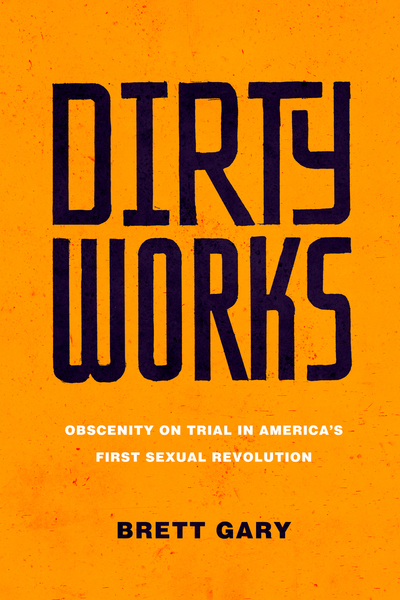
2021
448 pages.
$35.00
Hardcover ISBN: 9781503627598
Ebook ISBN: 9781503628694
Gold Medal (tie) in the 2022 Independent Publisher Book Awards (IPPYs) - History (U.S.) Category.
Gold Medal (tie) in the 2022 Independent Publisher Book Awards (IPPYs) - History (U.S.) Category.
A rich account of 1920s to 1950s New York City, starring an eclectic mix of icons like James Joyce, Margaret Sanger, and Alfred Kinsey—all led by an unsung hero of free expression and reproductive rights: Morris L. Ernst.
At the turn of the twentieth century, the United States was experiencing an awakening. Victorian-era morality was being challenged by the introduction of sexual modernism and women's rights into popular culture, the arts, and science. Set during this first sexual revolution, when civil libertarian-minded lawyers overthrew the yoke of obscenity laws, Dirty Works focuses on a series of significant courtroom cases that were all represented by the same lawyer: Morris L. Ernst.
Ernst's clients included a who's who of European and American literati and sexual activists, among them Margaret Sanger, James Joyce, and Alfred Kinsey. They, along with a colorful cast of burlesque-theater owners and bookstore clerks, had run afoul of stiff obscenity laws, and became actors in Ernst's legal theater that ultimately forced the law to recognize people's right to freely consume media. In this book, Brett Gary recovers the critically neglected Ernst as the most important legal defender of literary expression and reproductive rights by the mid-twentieth century. Each chapter centers on one or more key trials from Ernst's remarkable career battling censorship and obscenity laws, using them to tell a broader story of cultural changes and conflicts around sex, morality, and free speech ideals.
Dirty Works sets the stage, legally and culturally, for the sexual revolution of the 1960s and beyond. In the latter half of the century, the courts had a powerful body of precedents, many owing to Ernst's courtroom successes, that recognized adult interests in sexuality, women's needs for reproductive control, and the legitimacy of sexual inquiry. The legacy of this important, but largely unrecognized, moment in American history must be reckoned with in our contentious present, as many of the issues Ernst and his colleagues defended are still under attack eight decades later.
About the author
Brett Gary is a cultural historian and Associate Professor in the Department of Media, Culture, and Communication at New York University. Gary is the author of The Nervous Liberals: Propaganda Anxieties from World War I to the Cold War (Columbia University Press). He is a recipient of NYU's Distinguished Teaching Award, and the Steinhardt School's Teaching Excellence Award. His teaching and research interests include American cultural, legal, and political history, film and history, Hollywood film and masculinity, and censorship in American culture.
"This impressive book sheds new light on the entangled, ages-old relationship of law, progress, and morality. Brett Gary has written a compelling tour de force."
—Nadine Strossen, former president, American Civil Liberties Union
"Attorney Morris Ernst relentlessly pursued a mission to secure legal protection for sexual expression. Gary recounts legal strategies and courtroom dramas in an original and important work, both authoritative and compelling."
—Michael Schudson, Columbia University
"Gary brilliantly resurrects the stirring histories of those who championed the censorial cause with brutish force and those who battled against it with exemplary determination. This engagingly written and thoroughly remarkable book provides a salutary lesson of what can go wrong when the eyes of beholders are closed."
—Ronald K.L. Collins, co-author of We Must not be Afraid to be Free and editor of First Amendment News
"In this well-researched, beautifully written book, Gary provides a compelling account of the struggles over censorship, sex, and morality in an age of explosive technological, economic, and social change. This is a fascinating story that opens up new perspectives on the changing status of women and the sexual revolution of the 60s and 70s."
—Janice Radway, Northwestern University
"How did sexual freedom become the law? In this marvelous history, Brett Gary returns to the sexual revolution of the early 20th century and introduces us to the long-forgotten courtroom hero, Morris Leopold Ernst. If you think you know who broke the chain of Victorian sexuality, this book will make you think again."
—Fred Turner, author of The Democratic Surround
"Brett Gary offers an original, insightful, and compelling analysis of the evolution of American obscenity law. As Morris Ernst himself put the point, his work was a project of 'sex enlightenment' that enriched our nation's commitment to individual liberty."
—Geoffrey R. Stone, The University of Chicago
"Brett Gary's study of censorship in the modern U.S. is 'a study of progress.' Gary shows in great detail that struggles over pornography and birth control are part of a checkered, but ultimately noble history of the advance of 'the right to be an informed, educated, free sexual being.'"
—Francis G. Couvares, Amherst College
"An important book about a neglected figure in the fight for reproductive rights and freedom of expression."
—Kirkus
"Readers will appreciate the thoroughness and accessibility of this deeply researched account."
—Publishers Weekly
"[R]eaders interested in 20th-century U.S. history, civil liberties litigation, Ernst and his legal colleagues, birth control, or the cultural basis of obscenity laws will find this book worthwhile."
—Mark Jones, Library Journal
"Dirty Worksis meticulously researched, including careful attention to primary documents, and we can see a deep enthusiasm for archival exploration throughout the book. Thanks to the author's diligence, readers will find a wealth of new information... The book is incredibly thorough, and anyone working on this period in obscenity law will want to consult its pages."
—Jordan S. Carroll, Criminal Law & Criminal Justice Books